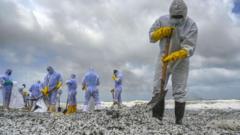Despite a prior commitment to assist victims of the chemical used during the Vietnam War, U.S. aid cuts have left many without much-needed resources.
Agent Orange Victims in Vietnam Face New Setbacks Amid U.S. Aid Cuts

Agent Orange Victims in Vietnam Face New Setbacks Amid U.S. Aid Cuts
The Trump administration's reductions in foreign aid hinder support for those affected by Agent Orange in Vietnam.
Nguyen Thi Ngoc Diem, a woman affected by Agent Orange in southern Vietnam, reflects a painful legacy of the Vietnam War. Born with physical deformities likely due to her father's exposure to the toxic herbicide, Diem once had hope for a brighter future thanks to U.S. aid programs.
In 2022, a U.S.A.I.D. initiative provided her with graphic design training, setting her on a path to employment. However, when the company she worked for shut down, her optimism faded as news of funding freezes filtered through. Contracts and support for victims like Diem have stalled due to President Trump's drastic cuts to U.S.A.I.D. funding, which could mean that a crucial loan Diem was counting on may never arrive.
“It makes no sense,” Diem lamented from her wheelchair, highlighting the paradox of the U.S. abandoning those impacted by its wartime actions. “A little support for people like us means a lot, but at the same time, it’s the U.S.’s responsibility.”
As she waits for assistance that may not come, Diem continues to rely on an outdated 2011 computer that struggles to keep up with her design work, underscoring the urgency of her situation. For her and many others, the cuts signal not just a loss of funding, but a betrayal of an earlier commitment to rectify past wrongs.























